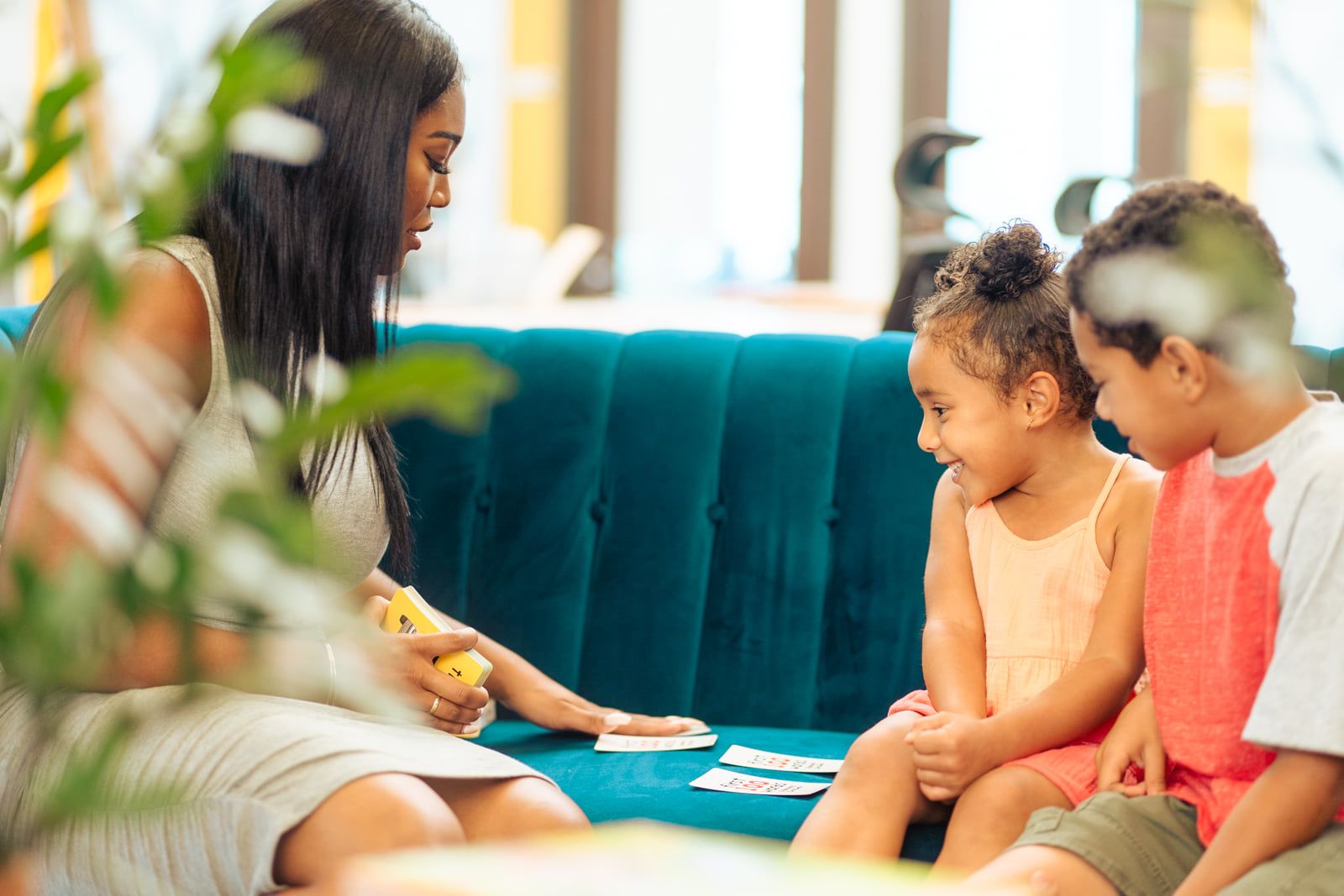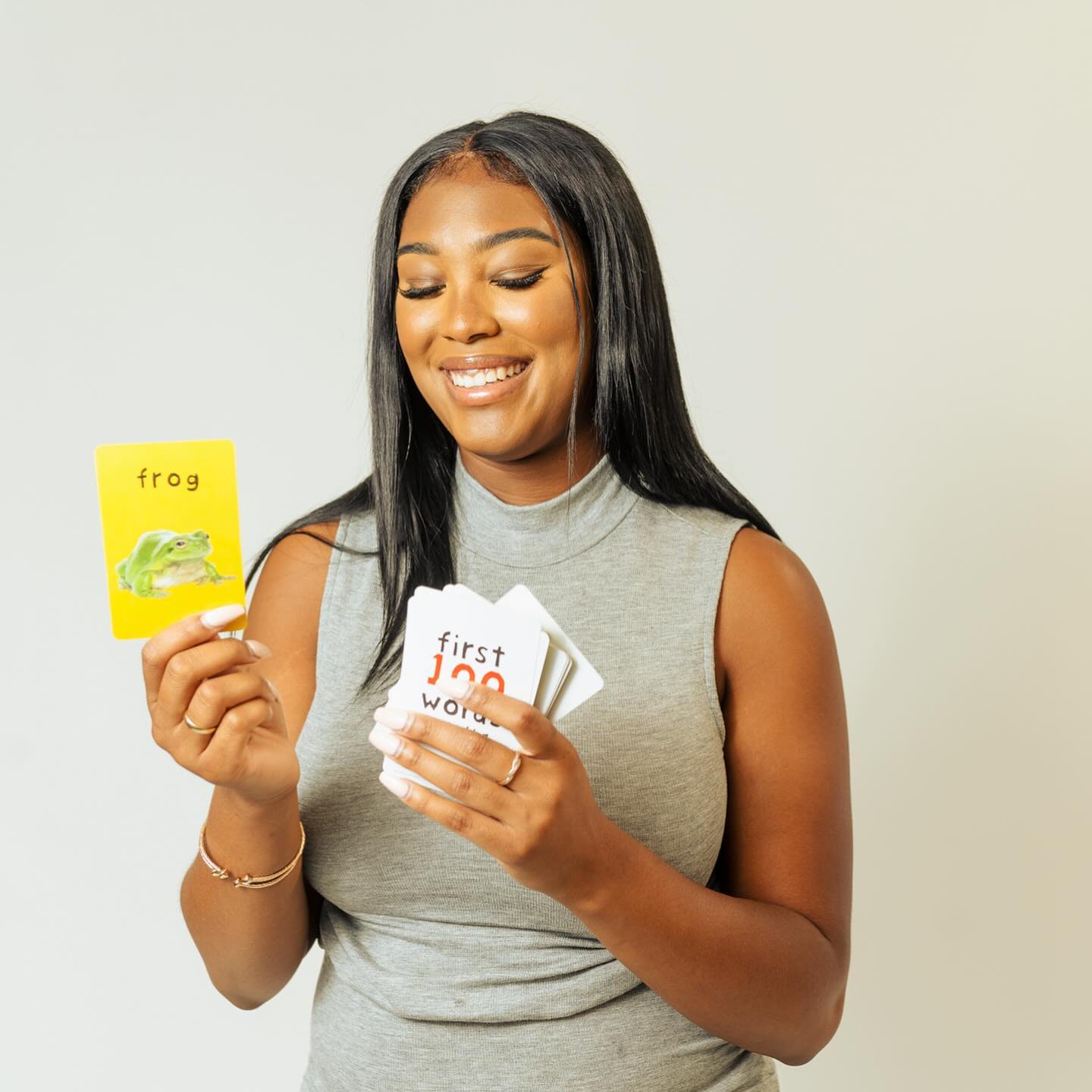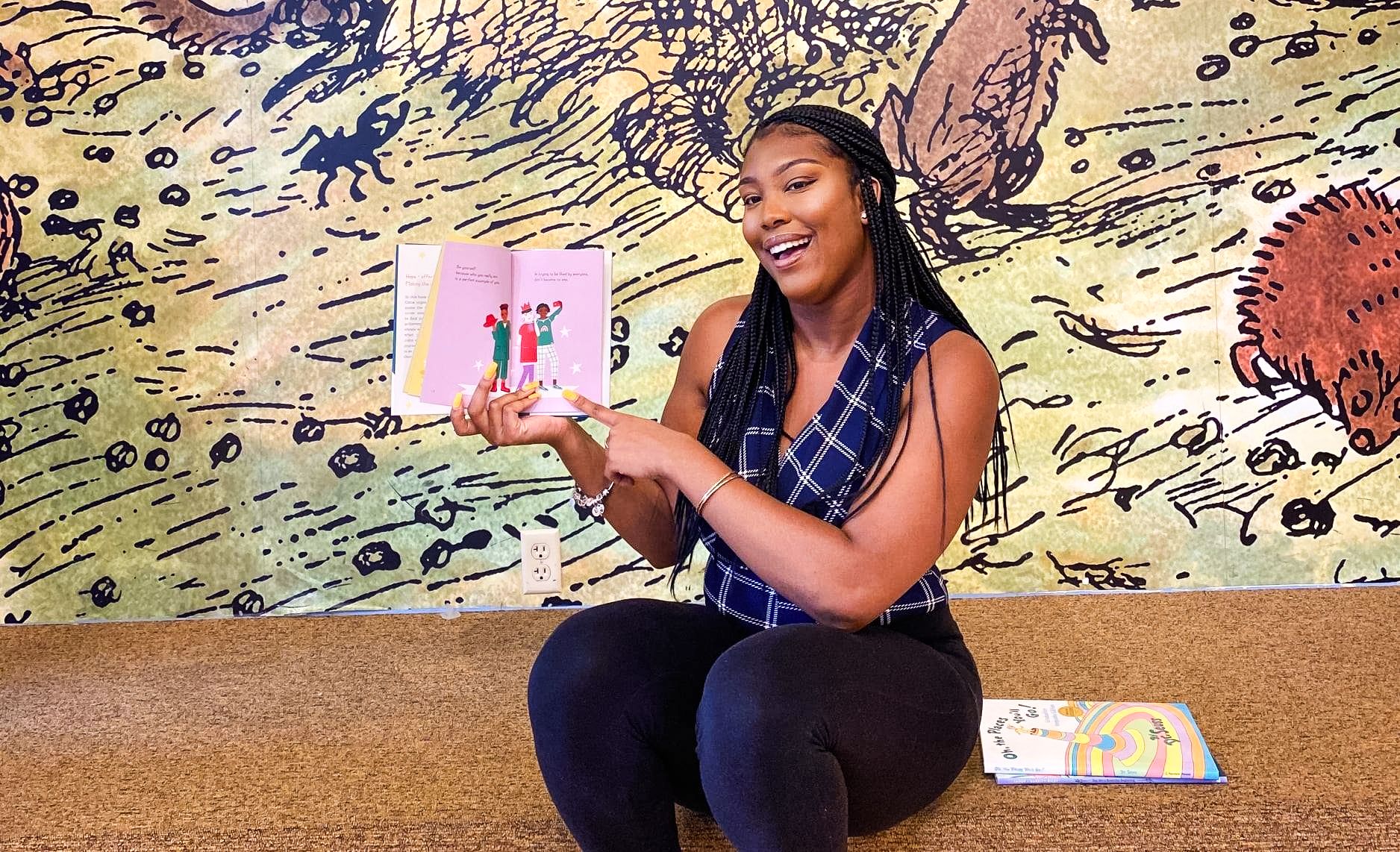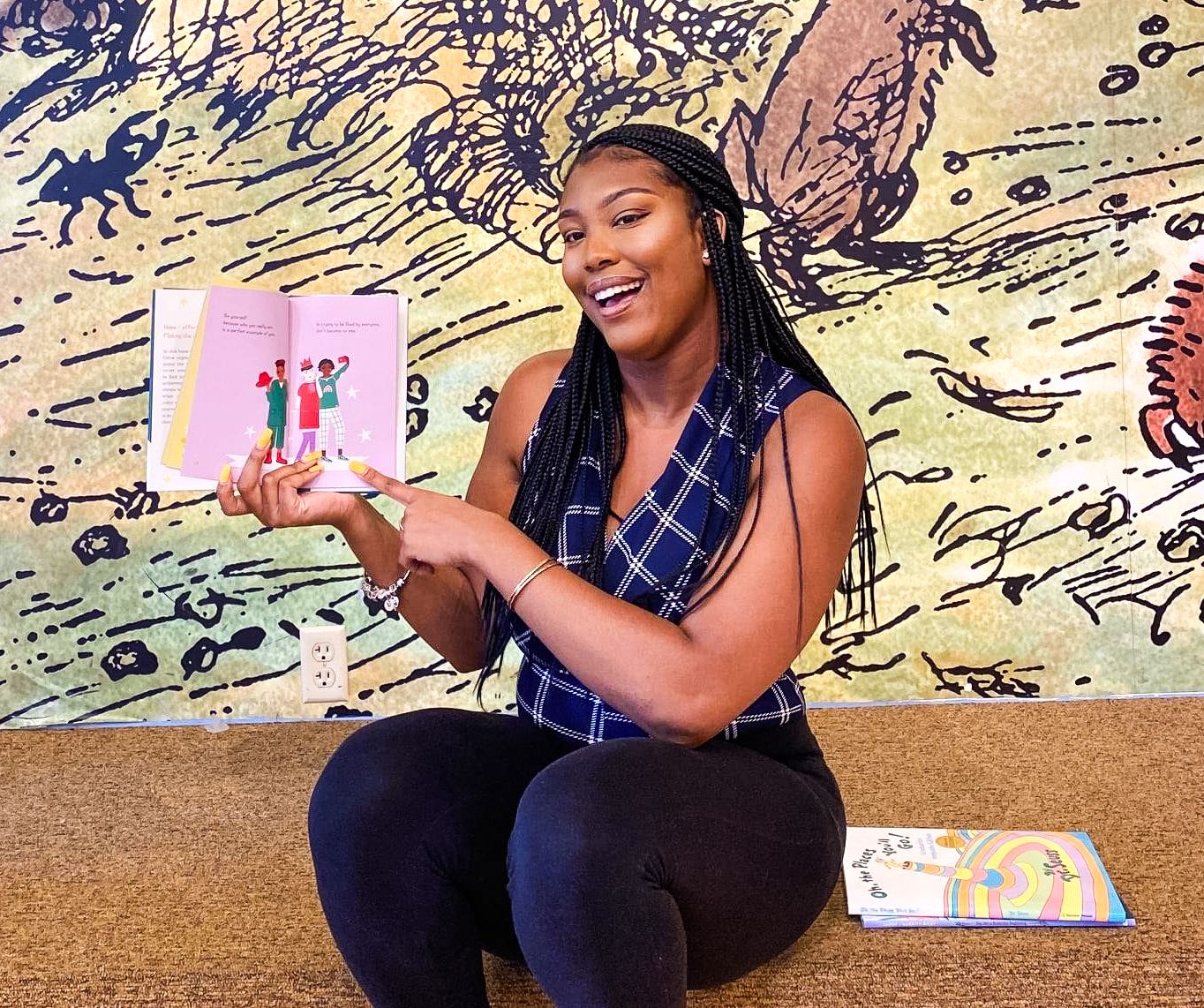SPEAKING OF SUCCESS
// By Rebecca Hoffa
// Photos by Xiana Gutierrez

It has been said that when someone tosses a coin, for the brief moment it is in the air, the person flipping the coin is able to determine what they really want.
When Breeah Carey (HHS’18, MS HHS’20) flipped a coin to determine her undergraduate direction between Purdue and a five-year university in Pennsylvania, she was faced with disappointment, staring down at a future in Pennsylvania. The twisting in her gut led her to flip again—and when she got the side that represented Purdue, she felt completely at ease.
Carey found her fit at the university as a speech, language, and hearing sciences major thanks to hands-on experiences, supportive faculty, and engaging coursework. After earning her bachelor’s and master’s degrees in Purdue’s highly ranked speech-language pathology program, she began working in New Jersey’s public-school system, serving as a speech-language pathologist (SLP). She also launched her own speech-therapy and tutoring center, Breeze Educational Services.
When Breeah Carey (HHS’18, MS HHS’20) flipped a coin to determine her undergraduate direction between Purdue and a five-year university in Pennsylvania, she was faced with disappointment, staring down at a future in Pennsylvania. The twisting in her gut led her to flip again—and when she got the side that represented Purdue, she felt completely at ease.
Carey found her fit at the university as a speech, language, and hearing sciences major thanks to hands-on experiences, supportive faculty, and engaging coursework. After earning her bachelor’s and master’s degrees in Purdue’s highly ranked speech-language pathology program, she began working in New Jersey’s public-school system, serving as a speech-language pathologist (SLP). She also launched her own speech-therapy and tutoring center, Breeze Educational Services.
Why did you decide to go into speech-language pathology?
I’ve always been very interested in the education field, and speech therapy was the best fit for me. I was inspired to get a lot of experience in the field and then branch out and do therapy the way I saw best, still being able to use evidence-based practices and still being able to work with classroom teachers and other professionals in that system.
What made you choose to continue at Purdue and get your master’s degree in speech-language pathology?
Purdue was ideal because I already knew the layout of the campus. I also knew a lot of the professors. I was very comfortable and active in the department. It made for a seamless transition into the graduate program. In my opinion, Purdue is really good about offering funding to out-of-state students, and there are lots of opportunities for assistantships. While I was there, I had an assistantship in the Department of Psychological Sciences. I was a teaching assistant for classes that were also related to speech, such as child development.
How have you seen your Purdue education shape your career?
My education from Purdue has definitely made me more confident because Purdue is one of the best universities in the world, and our program is ranked very highly for speech-language pathology. In terms of the content, it’s very diverse. You can be a medical SLP. You can be an educational SLP. You can go into private practice, or you can work in hospitals and nursing homes. Purdue’s program is well-rounded, so I believe I can work in any setting—and my grad school experience translates into real-life experience.

Why did you decide to go into speech-language pathology?
I’ve always been very interested in the education field, and speech therapy was the best fit for me. I was inspired to get a lot of experience in the field and then branch out and do therapy the way I saw best, still being able to use evidence-based practices and still being able to work with classroom teachers and other professionals in that system.
What made you choose to continue at Purdue and get your master’s degree in speech-language pathology?
Purdue was ideal because I already knew the layout of the campus. I also knew a lot of the professors. I was very comfortable and active in the department. It made for a seamless transition into the graduate program. In my opinion, Purdue is really good about offering funding to out-of-state students, and there are lots of opportunities for assistantships. While I was there, I had an assistantship in the Department of Psychological Sciences. I was a teaching assistant for classes that were also related to speech, such as child development.
How have you seen your Purdue education shape your career?
My education from Purdue has definitely made me more confident because Purdue is one of the best universities in the world, and our program is ranked very highly for speech-language pathology. In terms of the content, it’s very diverse. You can be a medical SLP. You can be an educational SLP. You can go into private practice, or you can work in hospitals and nursing homes. Purdue’s program is well-rounded, so I believe I can work in any setting—and my grad school experience translates into real-life experience.
Photo courtesy of Breeah Carey
Photo courtesy of Breeah Carey
Were there any faculty or staff members who were particularly influential for you?
Chenell Loudermill, clinical professor of speech, language, and hearing sciences, was the clinical director of the speech-language pathology program during my first year of graduate school. She was definitely supportive, especially because our field in general is not very diverse. Only 3% of speech-language pathologists identify as Black. It’s kind of like being in your own little bubble, so for me to see a department leader look like myself was inspiring. Also, Ronnie Wilbur, professor of speech, language, and hearing sciences—even as an undergrad, she would frequently check in with me and make sure I was doing well. During the summer, I would stay at Purdue to take classes, and she would allow me to assist in her lab.
How have you seen your work make a difference?
The biggest thing is seeing how my work impacts communities of color. The majority of the clients I work with, whether they’re in school or I see them in private practice, identify as people of color. I have clients from Latin America, Africa, the Philippines, and India, so that spectrum feels very representative of my upbringing. I grew up surrounded by diversity. So, coming back into this environment, I’m happy that I’m still able to give back to those communities and know they really appreciate someone who understands them and understands their culture.
What advice would you give to current students in your field?
Make connections early. Right now, especially with my generation, everyone is into social media. Whether it’s in person or virtually, make those connections. I’ve referred people via Instagram and Facebook, and they’ve made solid connections that way. There’s no excuse—everyone is already on their phones and easily accessible. You never know who you’ll meet.
Were there any faculty or staff members who were particularly influential for you?
Chenell Loudermill, clinical professor of speech, language, and hearing sciences, was the clinical director of the speech-language pathology program during my first year of graduate school. She was definitely supportive, especially because our field in general is not very diverse. Only 3% of speech-language pathologists identify as Black. It’s kind of like being in your own little bubble, so for me to see a department leader look like myself was inspiring. Also, Ronnie Wilbur, professor of speech, language, and hearing sciences—even as an undergrad, she would frequently check in with me and make sure I was doing well. During the summer, I would stay at Purdue to take classes, and she would allow me to assist in her lab.
How have you seen your work make a difference?
The biggest thing is seeing how my work impacts communities of color. The majority of the clients I work with, whether they’re in school or I see them in private practice, identify as people of color. I have clients from Latin America, Africa, the Philippines, and India, so that spectrum feels very representative of my upbringing. I grew up surrounded by diversity. So, coming back into this environment, I’m happy that I’m still able to give back to those communities and know they really appreciate someone who understands them and understands their culture.
What advice would you give to current students in your field?
Make connections early. Right now, especially with my generation, everyone is into social media. Whether it’s in person or virtually, make those connections. I’ve referred people via Instagram and Facebook, and they’ve made solid connections that way. There’s no excuse—everyone is already on their phones and easily accessible. You never know who you’ll meet.



